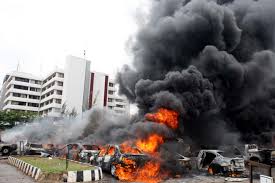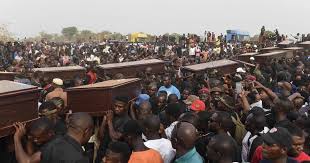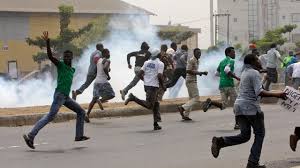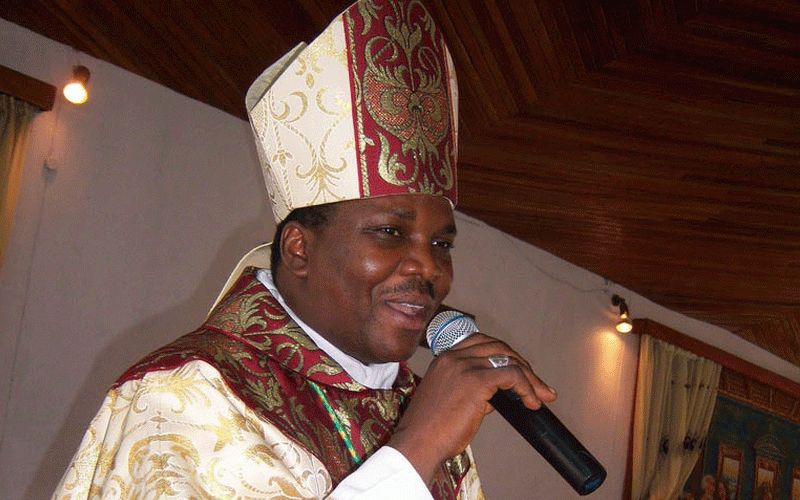


L’AGENCE DE NOUVELLES DE RECOWACERAO vous apporte cette voix forte habituelle du Nigéria lointain. Il a été sur les scènes nationale et internationale de lutte contre la corruption et l’insécurité. RECONA le décrit comme un activiste épiscopal. Dans divers cas, il a affronté de front les gouvernements du Nigeria et de notre continent africain. C’est Mgr Emmanuel Adetoyese Badejo pour vous. Évêque toujours actif du diocèse d’Oyo au Nigéria et président du Comité épiscopal panafricain des communications sociales (CEPACS). Il s’ouvre;
Dans la lutte contre divers insurgés opérant au Nigeria, les pays industrialisés où les armes utilisées par les mouvements rebelles sont fabriquées doivent « regarder vers l’intérieur » et revoir leur rôle dans la promotion de l’insécurité, évêque du pays le plus peuplé d’Afrique, le Nigeria a déclaré à notre correspondant dans une interview.
« Partout où il y a la guerre et les conflits, il y a une main derrière qui profite de tout », a déclaré la semaine dernière l’évêque nigérian Emmanuel Badejo en réponse aux facteurs de l’insécurité dans son pays.
Selon lui, outre les Africains eux-mêmes, les «puissances mondiales» qui fabriquent et vendent des armes sont un facteur important du défi de l’insécurité au Nigéria et dans d’autres parties de l’Afrique.
«Ces armes très puissantes entrent en Afrique et cela ne semble jamais se terminer!» a déploré l’évêque du diocèse d’Oyo au Nigéria.
«Je ne connais aucun pays africain qui produit des roquettes. Je ne connais aucun pays africain qui produit des bombes », a expliqué Mgr Badejo et a ajouté en référence à la série d’enlèvements, de tortures et de meurtres dans son pays,« Ce ne sont certainement pas seulement les Africains qui causent tous ces problèmes. »
L’évêque Badejo, qui fait également office de président du Comité épiscopal panafricain pour les communications sociales (CEPACS), a appelé « à l’extérieur de l’Afrique et aux prétendues puissances mondiales à se tourner vers l’intérieur et à faire un examen de conscience ».
« S’ils veulent vraiment un monde meilleur et veulent aider l’Afrique, alors ils devraient arrêter les ventes d’armes légères et de petit calibre en Afrique et découvrir qui sont exactement ceux qui fournissent ceux qui causent tous les problèmes », a déclaré Mgr Badejo, référencer les pays qui semblent «profiter de la crise» sur le continent à travers le commerce des armes.
«Il est temps que le monde écoute, car en fin de compte, si ça va mal pour l’Afrique, cela va se répercuter sur le monde entier», a déclaré Mgr Badejo.
Il a en outre souligné «le problème des immigrants» sur le continent, disant qu’il «fait partie des retombées des guerres en Afrique».
Il a déploré: «Après avoir détruit le territoire en Afrique, ils se retournent et se plaignent que nos jeunes migrent vers l’Europe.»
« Si les gens peuvent avoir un niveau de vie minimum et qu’ils doivent aller ailleurs pour trouver des pâturages plus verts et que les portes sont fermées, les murs sont relevés, c’est terrible », le président du CEPACS, le comité qui regroupe les évêques catholiques chargés de la communication dans les conférences sur le continent a déclaré.
Il a ajouté: «Le SECAM a abordé cette question à la fin de la dernière assemblée et a appelé toutes les puissances mondiales à faire tout leur possible pour y mettre un terme. Le Vatican a fait de même. »
Évoquant les récentes manifestations pacifiques menées par les évêques au Nigeria le mercredi des Cendres et le premier dimanche du carême au cours desquelles les dirigeants de l’Église au Nigeria ont appelé les organisations internationales à venir en aide à la nation, a déclaré Mgr Badejo, leur appel pourrait être confondu avec « subversion. »
Cependant, «Nous, les évêques, nous ne l’avons pas vu du tout comme ça», a-t-il précisé et expliqué, «Nous l’avons vu comme une responsabilité morale qui va au-delà du patriotisme, qui va au-delà de la nation du Nigéria parce que nous appartenons tous à une seule humanité et nous sont les enfants d’un seul Dieu. »
Dans l’interview avec notre correspondant en marge de la réunion du Comité permanent du Symposium des conférences épiscopales d’Afrique et de Madagascar (SECAM), le prélat nigérian a déclaré que les solutions pour la paix en son sein sont les bienvenues d’où qu’elles viennent.
« Nous n’appelons personne à prendre le pouvoir sur le gouvernement du Nigéria, mais si cela pouvait empêcher les insurgés de Boko Haram, les bergers peuls, les ravisseurs, les bandits qui massacrent des gens tous les jours et incendient leurs biens, » alors c’est une responsabilité morale pour ceux qui sont même en dehors du Nigéria de faire quelque chose », a-t-il dit.
«Partout où la vie est compromise, il est important que tous ceux qui ont la capacité d’arrêter le gaspillage inutile de la vie humaine fassent quelque chose», a ajouté Mgr Badejo.
Le prélat a en outre critiqué les dirigeants africains pour avoir reçu «des aides qui se présentent sous la forme de chevaux de Troie qu’ils obtiennent et qui détruisent le continent africain».
«Nos dirigeants doivent bien agir parce qu’ils ne semblent pas avoir le poids ou la force de dire non à une partie de la soi-disant aide qu’ils reçoivent», a-t-il conclu.
Xxxxxxxxxxxxxxxxxxxxx
RECOWACERAO NEWS AGENCY brings to you that usual strong voice from far away Nigeria. He has been on both the national and international scenes fighting corruption, and insecurity. RECONA describes him as an episcopal activist. In various cases, he has faced the governments in Nigeria and in our African continent head-on. That is Bishop Emmanuel Adetoyese Badejo for you. Ever working bishop of Nigeria’s Oyo diocese, and President of the Pan African Episcopal Committee for Social Communications (CEPACS). He opens up;
In the fight against various insurgents operating in Nigeria, industrialized nations where weapons used by rebel movements are manufactured need “to look inwards” and review their role in fostering insecurity, a Bishop in Africa’s most populous nation, Nigeria told our correspondent in an interview.
“Anywhere there is war and conflict, there is a hand behind that benefits from it all,” Nigerian Bishop Emmanuel Badejo said last week in response to factors behind insecurity in his country.
In his view, besides Africans themselves, the “world powers” that manufacture and sell weapons are an important factor in the challenge of insecurity both in Nigeria and other parts of Africa.
“These very powerful arms come into Africa and it does not seem to ever end!” the Bishop of Nigeria’s Oyo diocese lamented.
“I don’t know of any African country that produces rockets. I do not know of any African country that produces bombs,” Bishop Badejo reflected and added in reference to the series of abductions, torture, and murders in his country, “It is definitely not just Africans who are causing all these problems.”
Bishop Badejo who doubles as the President of the Pan African Episcopal Committee for Social Communications (CEPACS) called “on those outsides of Africa and the so-called world powers to look inwards and do an examination of conscience.”
“If they really want a better world and want to help Africa, then they should stop the sales of small and big arms into Africa and find out who exactly are those who are supplying those who are causing all the trouble,” Bishop Badejo said, referencing countries that seem to “benefit from the crisis” on the continent through the arms trade.
“It is time for the world to listen because at the end of the day if it goes bad for Africa, it is going to reverberate on the entire world,” Bishop Badejo said.
He further pointed to “the immigrant problem” on the continent saying it is “part of the fallout of the wars in Africa.”
He lamented, “After having destroyed the territory in Africa, they turn around and complain that our young people migrate to Europe.”
“If people can have a minimum level of living and they have to go elsewhere to find greener pastures and the doors are closed, the walls are raised, it’s terrible,” the President of CEPACS, the committee that brings together Catholic Bishops responsible for communication in the conferences on the continent said.
He added, “SECAM addressed that matter at the end of the last assembly and appealed to all world powers to do everything possible to stop it. The Vatican has done the same.”
Speaking of the recent peaceful protests spearheaded by Bishops in Nigeria on Ash Wednesday and the first Sunday of Lent during which Church leaders in Nigeria called on international organizations to come to the aid of the nation, Bishop Badejo said, their call may be mistaken for “subversion.”
However, “We Bishops didn’t see it like that at all,” he clarified and explained, “We saw it as a moral responsibility that goes beyond patriotism, that goes beyond the nationhood of Nigeria because we all belong to one humanity and we are children of one God.”
In the interview with our correspondent on the sidelines of the Standing Committee meeting of the Symposium of Episcopal Conferences of Africa and Madagascar (SECAM), the Nigerian Prelate said solutions for peace in his are welcome wherever they might come from.
“We’re not calling anybody to take over the government of Nigeria but if in any way that it could stop the Boko Haram insurgents, the Fulani herdsmen, the kidnappers, the bandits that are slaughtering people every day and are burning down people’s properties, then it is a moral responsibility for those who are even outside Nigeria to do something about it,” he said.
“Wherever life is compromised, it’s important for all those who have the capacity to arrest the unnecessary waste of human life to do something about it,” Bishop Badejo added.
The Prelate further criticized African leaders for receiving “Aids that come in the form of Trojan horses that they get that destroy the African continent.”
“Our leaders need to get their acts right because they don’t seem to have the clout or the strength to say no to some of the so-called aid that they get,” he concluded.
- CATHOLIC ARCHBISHOP IN GHANA HAILS POPE LEO XIV AS GOD’S GIFT - 23 mai 2025
- POPE LEO XIV TO APPROVE CANONIZATIONS - 22 mai 2025
- THE EVOLUTION OF PAPAL TRANSPORTATION - 20 mai 2025







